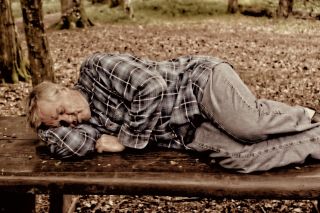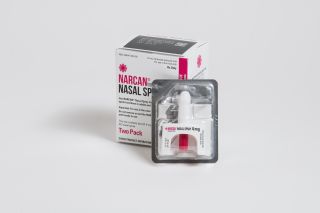Addiction
Should You Be a Bystander or Not? It Can Be a Hard Choice
A Personal Perspective: Responding to a potential overdose.
Updated August 15, 2023 Reviewed by Abigail Fagan
Key points
- With 100,000 Americans dying each year from drug overdoses, we all may come across someone needing help.
- It's difficult to know when to step in and intervene when someone may have overdosed.
- We struggle with not intruding on others and at the same time not ignoring those who may need help.
- Naloxone is an easy to use, over-the-counter first aid drug, used to reverse an opiate overdose.
I was recently coming home via the airport of a city that has taken knocks from the media (some appropriate, some distorted) about the way that unhoused people are handled, especially those with addiction. Pictures of tent encampments and stock footage of obviously unwell adults shambling down the streets usually fill the screen of these stories.
But the unhoused and those with substance use disorders (SUDs) don’t always fit in these obvious stereotypes.
To Check or Not to Check?

As I walked through the baggage claim area of the airport, I noticed what appeared to be a woman sitting in a corner, her phone charging, slumped over in an unnatural position. She didn’t appear to have any suitcases, or other signs of travel with her. A cane was leaning against the wall, and some of her belongings had fallen out of a small backpack. Most concerningly, she appeared to have slumped over, one leg outstretched in front of her, the other crossed at an odd angle, her face flat against her knees, arms awkwardly folded under her. I watched to see if she was breathing and realized that her breathing was slow and labored. Most concerningly, the position she was in put her at risk for positional asphyxia, where the weight of her body, coupled with her obviously drowsy state, put her at risk to stop breathing altogether, a condition that sometimes will kill users of opioids, which I suspected this woman might have taken.
The sight of her contorted body troubled me, and I struggled for a couple of minutes to know what to do, keeping her in my sight. All the while, people were streaming in and out of the restroom where she lay outside, next to the door. A few people cast sidewise glances at her unnatural contortion, but most hurried about the business of being in an airport. The bystander effect on full display, I struggled to know what to do. Should I check on her or go about my business of getting home, hope she was ok, and forget what I saw? I’m not interested in being a hero. I just want to get home, but my conscience is weighing on me.
What to Do When Someone May Have Overdosed

I could see that she was breathing, but I began to wonder if she had overdosed on an opiate. We had 620 overdose deaths in San Francisco last year, with almost three-quarters of them involving fentanyl. I usually carry naloxone (Narcan) nasal spray (it's sprayed up the nose and can quickly reverse an opioid overdose and can be obtained over the counter, sometimes for free), and have for years in my day-to-day backpack, for a situation such as this, but I did not have that bag with me today. I considered finding a police officer, but thought that if she was not in danger, that might have escalated her situation unnecessarily. I knew what to do but I didn’t know if I should do it.
I reminded myself that I’m a nurse, and I needed to continue my assessment. Not wanting to startle her, I gently tapped on the sole of her outstretched foot with my own foot, saying loudly “Ma’am, ma’am, are you ok?” After what felt like several long seconds, she startled awake, a woman in her mid 60’s, looking up at me with bright blue eyes and pinpointed pupils, clearly surprised, and said, “yes, yes,” and then proceeded to rummage around her belongings, seemingly embarrassed. Reassured that she was arousable and still breathing, I went to go meet my ride home, but left the encounter deeply unsettled. I felt relieved that she had not overdosed, and at the same time, felt like I had intruded upon someone else’s private struggles and added to them with the humiliation of having been seen in a low moment when she was only looking for a safe place to rest and charge her phone.
I don’t know if I did the right thing, but I do know that over 100,000 people die each year from overdoses in this country. Naloxone is a medication that will quickly reverse an opiate overdose and is now available over the counter, and some states and municipalities will provide it for free. It’s easy to carry and free to use, but I realized the bigger problem wasn’t knowing what to do. While I’m a nurse, naloxone administration is easy and could be done by a trained child. The harder issue was to know when to cross that line, to move from minding my own business to serving as my brother’s keeper. While this woman was embarrassed, I was grateful she wasn’t angry or hostile towards me for startling her. Such a response is not always guaranteed.
Oddly, if this woman had tripped and fallen down the stairs, I wouldn’t have thought twice about rendering aid. But in that case, the assumption would be that she would want help. With drug overdoses, there remains the pervasive (and seemingly unconscious) notion that people who suffer from substance use disorders do so of their own volition and thus, do not want help. While I know many people with SUDs will sometimes reject help, I resist the idea that they want to die. Yet, even as someone who works with people with substance use disorders, I too hesitated to intervene.
In a city with all the problems that come with it, it’s impossible to, and nor would I want to be responsible for the problems of others. I also know I can’t ignore them once I realize what is happening. I’m reminded of the words of Maya Angelou, “Do the best you can until you know better. Then when you know better, do better.” I hope that on this night, I did better.


